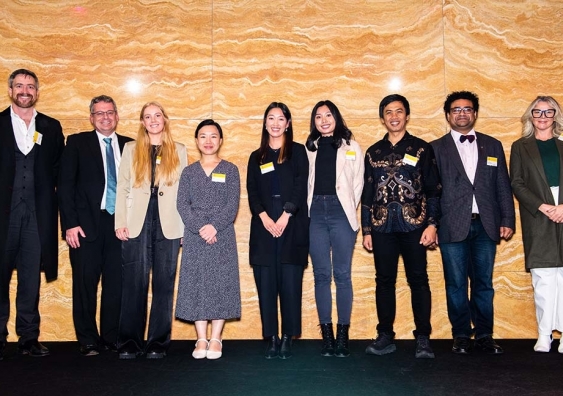Sniffing out lung disease takes this year's 3 Minute Thesis top prize
Scientia PhD candidate Merryn Baker wowed judges with her presentation on diagnosing lung disease through breath analysis
Scientia PhD candidate Merryn Baker wowed judges with her presentation on diagnosing lung disease through breath analysis

Emi Berry
Corporate Communications
0413 803 873
e.berry@unsw.edu.au
UNSW PhD candidates were given the opportunity to showcase their innovative research at the annual UNSW 3 Minute Thesis (3MT) finals last week. Eighteen��PhD candidates had just three minutes and a single Powerpoint slide to explain their world-changing research and why it’s so important.����
This year’s presenters explored new frontiers in health, education, law and justice, engineering, and business. The judges – internationally acclaimed Physician-Scientist Dr Sonu Bhaskar, innovator and strategist Zina Kaye, and UNSW’s Vice-Chancellor and President Professor Attila Brungs – had a hard time selecting a winner.����
“I have been involved in the 3 Minute Thesis Competition for over 10 years, and this is the best 3MT I have ever seen,” said Vice-Chancellor and President, Professor Attila Brungs. “The quality and passion were inspiring.”����
Merryn Baker from the School of Chemistry��at UNSW Science ultimately stole the show with her talk on developing a new non-invasive way of diagnosing lung disease through the analysis of the chemicals in our breath.��
Diseases like cancer have been shown to change the concentration and type of chemicals in our breath. But isolating these chemicals is like searching for one drop of water in an Olympic swimming pool. Through her winning 3MT presentation, Baker explained how she is developing materials that can act like a net to capture the molecules produced by lung cancer, and ultimately give rise to a diagnostic tool that’s non-invasive, easily accessible, and rapid.������
Ms Baker was presented the top prize of $3000 and will now represent UNSW at the Asia Pacific 3MT competition hosted by the University of Queensland on 19 October as well as the Universitas 21 3MT competition on 10 October.����
Read more:��10 Minute Genius: Veena Sahajwalla on why there is no such thing as waste
Ms Baker said she was over the moon about her win. “The quality of the presentations was outstanding, and I’m thrilled and honoured to have received first prize and to join the Asia Pacific Final and the University of Queensland.”����
Fiona Li from UNSW Medicine and Health took out the second prize and was awarded $1500 for her talk on her research into the dangers of vaginal laser treatments. The third prize was awarded to two participants in a joint win of $500 each: Esta Qiu from UNSW Engineering for her presentation on making the public transport system more equitable and Ada Lee from UNSW Engineering who explored how the efficient capture of stem cells could make gene therapy more affordable.����
Junjun Muhamad Ramdani from UNSW Arts, Design and Architecture took out the People’s Choice Award and $1000 for his talk on improving language teaching through collaboration between teachers and students.����
Samuel Frimpong from UNSW Arts, Design and Architecture received an honourable mention from the judges for his talk on promoting positive mental health among young construction workers from the Global South.����
“The UNSW 3MT Competition was a melting pot of fantastic ideas, passion, and research from some of the brightest minds at UNSW. It's an exciting time for science and innovation in Australia,” said Judge Dr Sonu Bhasker.����
Professor Jonathan Morris, UNSW’s Pro Vice-Chancellor Research Training & Entrepreneurship and Dean of Graduate Research said, “Our PhD candidates are engaged in world class research, and the 3MT competition showcases their work in a really engaging and accessible way”.��
“I want to congratulate all our outstanding finalists for their efforts. Each has provided a window into their exciting work and highlighted their ability to communicate and show their passion for their research.”��
Videos of this year’s presentations will be published on the UNSW website.����